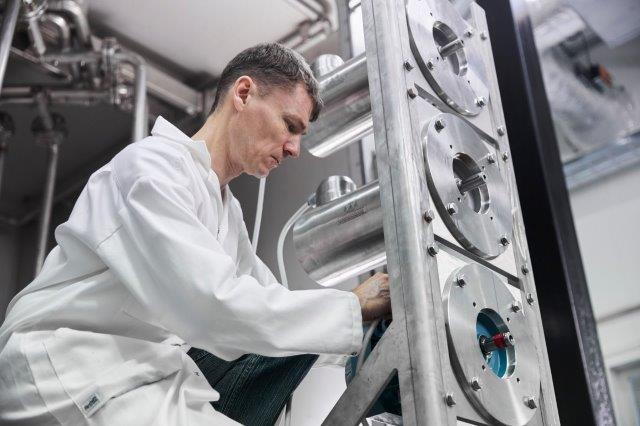Rigorous testing at a state-of-the-art hygiene laboratory verifies that ABB’s Food Safe stainless steel motors can withstand frequent sanitation. The motors emerged in full working order after being subjected to tests simulating years of operation in harsh washdown environments.
Maintaining product safety in food and beverage plants requires strict hygiene standards. Frequent washdowns are required to avoid contamination. The challenge is that electric motors used in these facilities can be damaged by aggressive cleaning. Motors specifically designed for these applications can help ensure food safety, improve reliability and reduce the risk of unscheduled plant downtime.
ABB Food Safe motors address the washdown challenge. They feature a stainless steel housing to resist corrosion and IP69 ingress protection to ensure that high-temperature, high-pressure spraying will not cause damage. They are also easy to clean, with a smooth, self-draining outer surface that has no angles where contaminants could gather.
“Our Food Safe motors are already in use at a number of customer plants,” says Tero Helpio, Global Product Manager, IEC Food Safe motors, ABB Motion. “In order to prove their long-term performance under realistic washdown conditions, we worked with a state-of-the-art hygiene laboratory in Västerås, Sweden to devise a set of tests replicating industrial-type sanitising procedures.”
Two IEC stainless steel Food Safe motors were subjected to the tests and were largely unaffected and still in full working order at the end of the test programme. In particular, no water, condensation or indication of corrosion was found inside the motors. All the three main O-rings and drain plugs remained tight.
For comparison purposes, a standard painted aluminum motor was also tested. It started to deteriorate very quickly and failed well before the end of the test. The paint on the housing blistered and flaked off and the shaft and other steel components suffered severe corrosion. Washdown chemicals penetrated both the terminal box and main housing, causing short circuits between the phases and ground. The aluminium rating plate became detached from the motor.
“Paint flakes, rust and particles could contaminate food products, leading to an expensive recall,” Helpio explains. “Some plants try to get around these problems by protecting their standard motors with shrouds, but these shrouds actually cause new issues. Food particles can collect inside the shroud, hidden from view, providing the potential for bacteria to grow.”
Food Safe stainless steel motors eliminate the need for motor shrouds, providing 360°access for inspection and sanitisation. The easy-to-clean surfaces also mean that less water and chemicals are needed. The tests prove that Food Safe motors successfully withstand washdown conditions, giving plant operators confidence that they will help to reduce unscheduled downtime.








